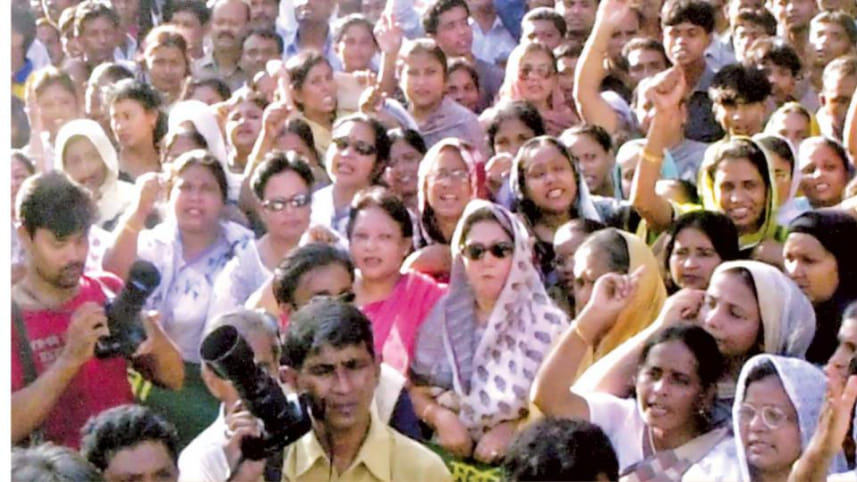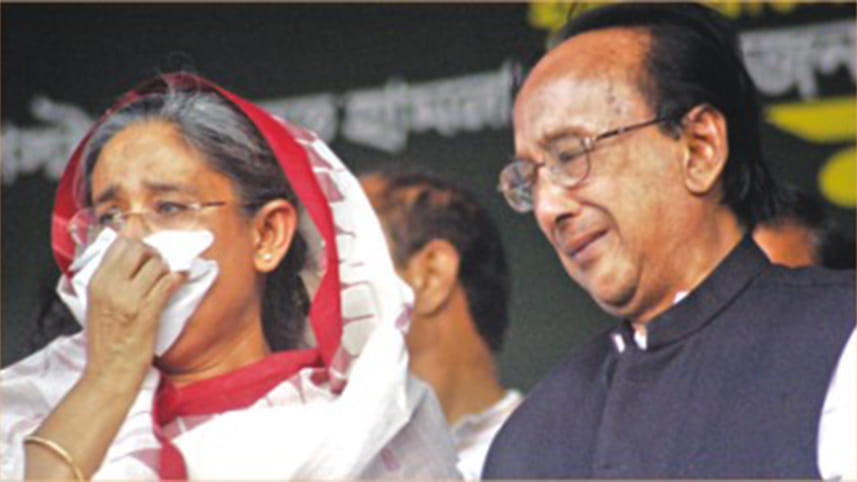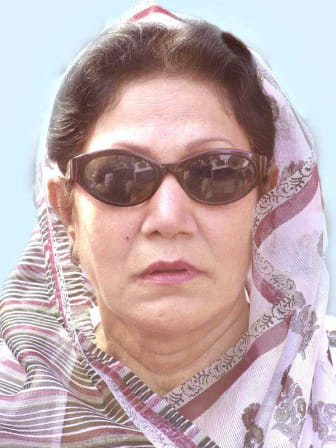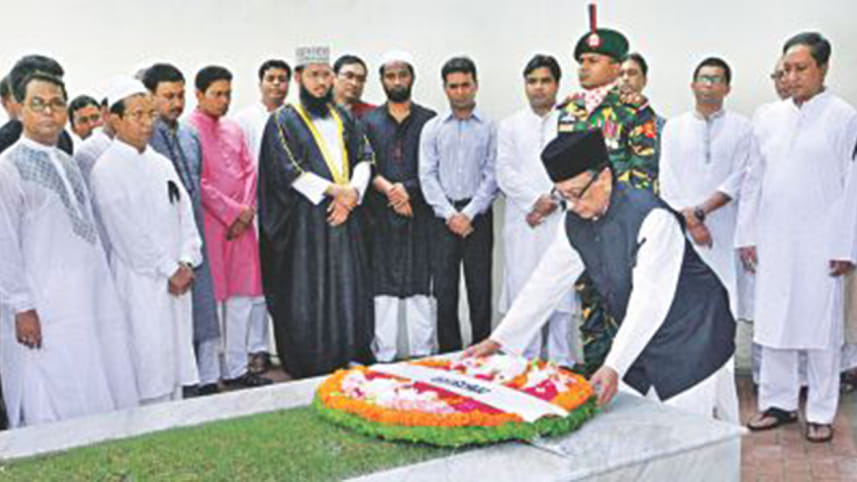From the archives: Ivy Rahman, a strong voice silenced forever

Ivy Rahman, one of the strongest voices for democracy and women's rights the nation heard till today, was silenced forever in the carnage on August 21, 2004.
The Women's Affairs secretary of the then political opposition Awami League was the biggest name among the 24 persons who lost their lives in the grisly grenade blasts at an AL rally on the premises of its then central office at Dhaka's Bangabandhu Avenue.
On the fateful day, Ivy Rahman was among the women AL activists close to the makeshift dias on a truck where Sheikh Hasina, the party chief, was delivering her speech.
Anisur Rahman, deputy chief photographer of The Daily Star who was covering the AL rally that day, was right behind Ivy Rahman when grenades were hurled on the truck-turned-dais targeting Sheikh Hasina.
The grenades, however, missed the target and fell on the ground close to the truck and exploded among the audience.
"Men and women were lying on the street in pools of blood. Their limbs were torn apart. The impact of the grenade had shredded their clothes," Anisur Rahman said as he recalled the day.
"And then I noticed a blood-stained Ivy Apa slumped in a heap on the road in front of me."

According to witnesses, Ivy was close to the stage and was found lying facedown on the pavement in front of the AL office after the attack. Her both legs were pounded by the explosion.
She became one of the worst victims as the first bomb landed just a few feet away from the stage.
In a span of around two minutes, a total of 13 grenade blasts rocked the area and turned the place to resemble the set of a post-apocalyptic film, before the shell shocked people finally made a move, either for their lives or to rescue those whose lives were hanging on a thread.
"I saw a man in a bright orange shirt come out of an alley and run towards Ivy Rahman. He tried to lift her. A mortician of the Dhaka Medical College Hospital, who I knew from before, also joined him. They sat her up. Ivy Rahman had a blank look. She was in shock. She looked down at her legs which were missing from above her knees. Then she collapsed," the photojournalist said.
She was carried to a car to be whisked away to Dhaka Medical College Hospital (DMCH), where doctors amputated her legs, which were pulverised in the blasts. According to the DMCH authorities, a three-hour operation was conducted on her and doctors were compelled to amputate her legs.
She was later shifted to the Combined Military Hospital (CMH) in the capital.
Ivy also had injuries to her chest and hands and her condition was critical. She lost a good amount of blood that made her condition more vulnerable.
The AL leader had another operation at the CMH at around midnight on the same day.
Rani, a Women AL activist of Ward No 58, told The Daily Star that she was just two feet away from her Ivy Rahman on the day of the incident.
The first bomb blast led to a chaos in the area and Rani saw bombs hurled from the ground level hit her when she tried to run away. Rani crawled for a safer place and found her (Ivy) lying unconscious in a pool of blood, she said.
Ivy Rahman finally succumbed to her injuries at the intensive care unit of the CMH on August 24. She was 60.
She fought for her life for three days after sustaining the grievous injuries in August 21 grenade attack.
Ivy had been in coma ever since she sustained injury. She was given 22 bags of blood during a number of surgeries that followed the amputation.

CMH doctors informed Ivy's family of her death at 2:30am over telephone. Ivy's husband and former AL general secretary Zillur Rahman (who later became the 19th President of Bangladesh in 2009 after Awami League was elected in the landmark December 2008 general elections), was informed of his wife's death at around five o'clock in the morning of August 24.
She was buried at Banani Cemetery on the night of August 25 after her namaz-e-janaza.
"I don't want mere sympathy on my wife's death, I want justice," Zillur Rahman said at the qulkhwani of Ivy Rahman at her Gulshan residence in Dhaka on August 27, 2004.
Zillur Rahman MP, then AL presidium member, told the journalists on the same programme, "Wherever I look, I see Ivy. I never knew people loved her so much."
"My only consolation now is that Ivy died while protesting against terrorism and people will remember her ideals, her dedication to politics and society for a very long time," he added.
Zillur Rahman died at the age of 84 at a Singapore hospital on March 20, 2013.
The death of Ivy, who was a witness to the nation's turbulent history since the Pakistan days, put an end to a checkered political career.
Profile of Ivy Rahman
Ivy Rahman, maiden named Jebun Nahar Ivy, was born on July 7, 1944 in 'Baro Bari' in Bhairab, Kishoreganj. She was the fifth among eight sons and three daughters of eminent principal of Dhaka College late Jalal Uddin Ahmed. Her elder sister Shamsur Nahar Siddique is the mother-in-law of Awami League (AL) President Sheikh Hasina.

Ivy became widely known as Ivy Rahman since her marriage with frontline AL leader and former local government, rural development and co-operatives minister Zillur Rahman (President of Bangladesh from February 12, 2008 to March 20, 2013) on June 27, 1958.
A graduate from Dhaka University, Ivy was an active worker of AL's student front Bangladesh Chhatra League in her student life and took part in numerous political movements under the leadership of Banghabandhu Sheikh Mujibur Rahman.
As a member of Mukul Fouz and Girls Guide, Ivy was also earnestly involved in social work, and strongly believed in and fought for establishing women's rights.
Ivy, popularly known as Ivy Apa, was the founding organising secretary of AL's women's wing, Mohila Awami League, established by Bangabandhu in 1969.
As a freedom fighter she took training in guerrilla warfare in 1971 and had numerous contributions in the war against the Pakistani occupation forces in the 1971 Liberation War.
During the uprising against the autocracy of Ershad, she was one of the strongest voices the nation heard demanding democracy in the country.
She was elected women's affairs secretary of AL Central Working Committee in 1978 and two years later she became the president of Mohila AL. She had served in those positions until 2002.

After the amendment of AL's manifesto by its council in 2002, Ivy resigned from the post of Mohila AL president and was elected women's affairs secretary of AL's central body.
From 1996 to 2001, Ivy also served as the chair of Jatiya Mohila Sangstha and Bangladesh Jatiya Mohila Samabaya Samity, and was the president of Mohila Samity and general secretary of Bangladesh Andhakalyan Samity until her death in 2004.



Comments